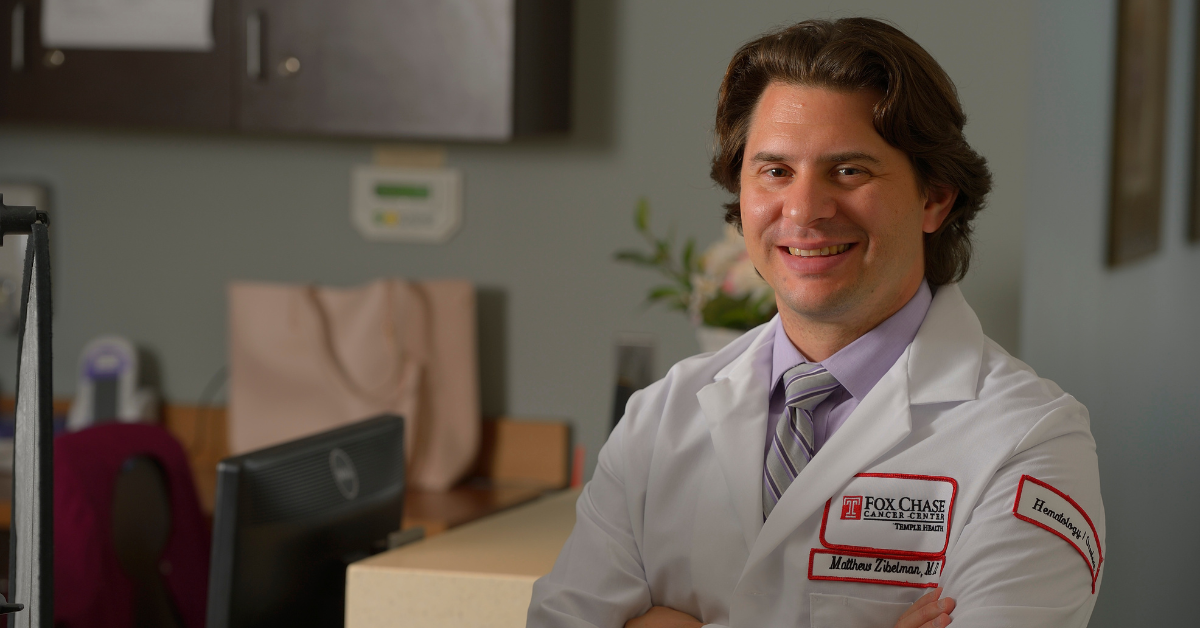
PHILADELPHIA (February 15, 2025) — A new study presented today by researchers at Fox Chase Cancer Center shows that some patients with metastatic kidney cancer receiving a combination therapy can safely stop or pause treatment after two years if they have a good response.
The finding could potentially reduce the impact of uncomfortable side effects and treatment complications for a subset of kidney cancer patients. It’s the first time a clinical trial investigating this combination therapeutic approach has included stopping treatment prospectively as part of the design.
“My main takeaway from this is that there are subsets of patients that can have durable disease control with these drugs, and they may not need to stay on both therapies,” said Matthew Zibelman, MD, an Associate Professor in the Department of Hematology/Oncology at Fox Chase and first author on the study.
“Careful patient selection can allow some patients to have long periods of time off continuous therapy,” added Zibelman, who presented his research at the 2025 American Society of Clinical Oncology (ASCO) Genitourinary Cancers Symposium.
The phase 1/2 clinical trial investigated a combined therapy of nivolumab, an immune checkpoint inhibitor, with axitinib, an oral tyrosine kinase inhibitor (TKI), in patients with relapsed metastatic renal cell carcinoma. The combination of TKIs and checkpoint inhibitors is considered the standard of care for this patient population.
Zibelman noted that, in the seven years since the trial started, newer drugs have surpassed the performance of nivolumab/axitinib, making the approval of this particular combination unlikely – and unnecessary. More interesting was the study’s finding on patients who were able to stop treatment, he said.
Of 26 patients in the trial, six chose to stop one or both drugs after two years. Of these, five remained progression-free two years later, with no additional therapy needed. Previous studies of similar drug combinations did not look at the option of stopping therapy.
Zibelman noted that these types of medications can cause side effects, and oral TKIs in particular can lead to cumulative toxicities because they are taken every day. Common side effects can include diarrhea, sores in the mouth and mucosal tissues, fatigue, loss of appetite, and skin changes to the hands and feet. Side effects generally go away when the medication is stopped.
“Being able to take periods of time off treatment without fear that your cancer is going to immediately progress can be meaningful for patients,” Zibelman said.
In addition to potentially avoiding side effects, stopping or pausing therapy can reduce the amount of time patients spend visiting the clinic, as well as reducing costs for the healthcare system, he noted.
Zibelman said it’s likely the study’s findings will apply to similar drugs.
“For patients who are using an oral therapy and an immunotherapy, if they are having good disease control at a certain point in time they may be able to stop one or both therapies,” he said. “It doesn’t have to be just this combination. It would apply to any of the combinations out there.”
Researchers hope to publish results later this year looking at similar outcomes in kidney cancer patients receiving first-line therapy. They are also interested in studying potential biomarkers of response or resistance that could be used to select patients for different drug combinations.
The paper, “Results From the Prior Treatment Cohort of a Phase I/II Study of Nivolumab and Axitinib in Patients With Advanced Renal Cell Carcinoma,” was presented at the 2025 ASCO Genitourinary Cancers Symposium, which is being held in San Francisco February 13-15.